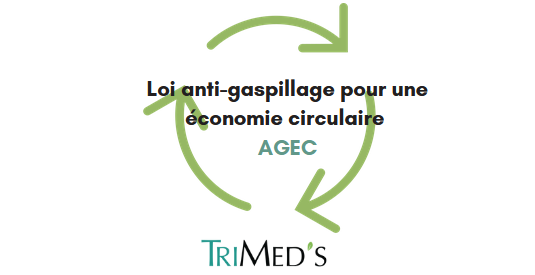
The anti-waste law for a circular economy (AGEC) has been launched since February 2020 with the objective of reducing waste and promoting a circular economy.
Since January 2022, new measures have been added to those already set in order to strengthen this quest for sustainable development and to raise awareness among companies by making them the main actors of this ecological transition.
What are these new measures? And what will change in 2022?
The AGEC law is mainly based on five main axes:
- Getting rid of disposable plastic
- Better inform consumers
- Fight against waste and promote reuse
- Fight against programmed obsolescence
- Better production
The implementation of all these measures is programmed over several years in order to operate a progressive and sustainable change.
Getting rid of disposable plastic:
This measure aims to remove single-use plastics from the market by 2040. To achieve this, the law will encourage the reuse and recycling of plastic materials and reduce its production in general by replacing it with biodegradable materials.
The law also signals the end of plastic packaging for fruit and vegetables and certain toys on children's menus. Just as it plans to support market players in their transition.
Better informing consumers:
A stronger device in 2022 that is intended to be transparent on more environmental information that would be of interest to the consumer such as repairability, compostability or recyclability.
Gone are the vague and misleading formulas on products. Make way for precise and clear information based on experiments and proven results.
Fight against programmed obsolescence:
The law obliges manufacturers to display the reparability index of each product and prohibits programmed obsolescence, which was aimed at encouraging the repurchase of products.
Various measures facilitate the availability of new and used spare parts for professional repairers and extend the legal guarantees of conformity.
Better production:
The law intends by this measure to extend the responsibility of manufacturers in the management of their waste by creating new channels that promote the reuse and recycling of their products and by modifying their manufacturing processes with the adoption of more environmentally friendly materials.
Fighting against waste and promoting reuse:
After drastic measures to fight against food waste with the "Garot" law of 2016, the AGEC law comes to tackle non-food waste with the objective of prohibiting the destruction of unsold goods.
Since January 2022, companies are obliged to promote the reuse of their unsold non-food products, the recycling or the donation in order not to waste them. This measure applies to textiles, electrical and electronic equipment, as well as to certain specifically targeted products such as books or hygiene and childcare products. The law intends to extend the scheme to other types of products by 2023.
TriMed's seizes the opportunity to allow pharmacists, sellers of hygiene, childcare and health products in general, to find a way out of their soon expired unsold products by selling them at a discounted price, or by giving them to associations against a receipt that would allow them a tax reduction on the year N+1. Whatever the choice of the pharmacist, he will be a winner by opting for a solution that allows him to respect the law, to gain in turnover, to reduce his losses and to do something for the environment by following a CSR approach.
You are a pharmacist and you want to know more? Visit our website on trimeds.fr
References : ZEROWASTE France and the website of the Ministry of Ecological Transition
